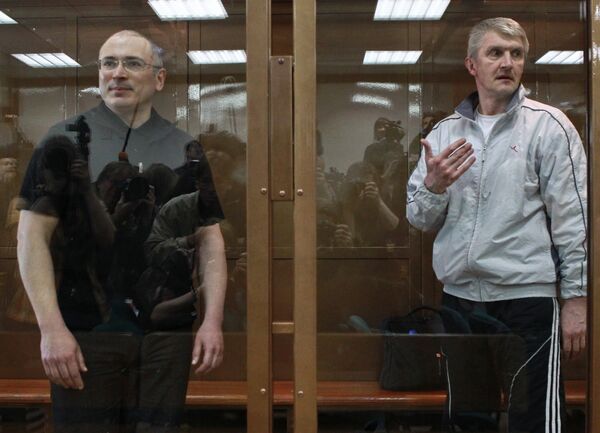MOSCOW, July 25 (RIA Novosti) – The European Court of Human Rights (ECHR) ruled Thursday that the 2005 conviction against Russian businessmen Mikhail Khodorkovsky and Platon Lebedev was based on legitimate charges, dismissing their complaint that their prosecution was politically motivated, but found that the hearing of their case was unfair.
The court ordered Russia to pay Khodorkovsky $13,200 in damages for numerous violations of his rights during the high-profile trial.
Khodorkovsky, the former CEO of Russian oil giant Yukos, and his business partner Lebedev were tried and sentenced to eight-year jail terms on charges of large-scale tax evasion and fraud. Thursday’s ruling by the ECHR stated almost eight years after the trial ended that the charges had been brought on "a sound basis," but that numerous violations had been committed during the trial.
Khodorkovsky’s lawyer, Karinna Moskalenko, praised the ruling, stressing that the ECHR’s findings that parts of the trial were unfair could constitute the basis for a reversal of the 2005 verdict.
“The court’s finding is of huge significance: Khodorkovsky and Lebedev did not receive a fair trial,” Moskalenko said in remarks posted on the website of the jailed men’s legal team.
The charges launched in 2003 against Khodorkovsky and Lebedev are commonly known in Russia as “the first Yukos case,” and led to a crackdown on the company and its eventual liquidation.
The trial, which was one of that decade’s most high-profile legal cases in Russia, was widely criticized by human rights groups.
Many managers of Yukos – once Russia’s biggest oil company – and its subsidiaries fled Russia, while others were tried and convicted. The businessmen and their supporters have maintained that the clampdown was politically motivated, and was the Kremlin’s revenge for Khodorkovsky’s political and business ambitions. The Strasbourg court found no grounds to support this claim, the statement said Thursday.
The ECHR found that the Russian authorities had violated a range of the defendants’ rights during and after the legal proceedings, including by sending both to remote penal colonies in Siberia and Russia’s far north – thousands of kilometers away from their families – and by breaching lawyer-client confidentiality. The court also found that the authorities had harassed Khodorkovsky’s lawyers.
The men’s defense team said it was not planning to appeal the ruling. Russia’s envoy to the ECHR did not immediately say whether the country would appeal.
Russia’s Supreme Court declined to comment on the ruling to Russian media.
Human rights veteran Lyudmila Alexeyeva condemned part of the ruling, saying there was clear proof of political motivation in the case.
“I think it is a cowardly ruling,” Alexeyeva told RIA Novosti on Thursday, adding that the ECHR had fallen considerably in her estimation following the announcement.
In 2011, the ECHR ruled that the 2003 arrests of Khodorkovsky and Lebedev were unlawful, but also failed to find the political motive cited by the men’s defense.
In 2010, a Moscow court found the two businessmen guilty on related fraud and embezzlement charges, which were denounced by prominent legal experts and lawyers as far more controversial than the charges brought in the first case.
Khodorkovsky and Lebedev are due to be released in fall 2014.
(Updated with comments from lawyers and human rights advocate)


